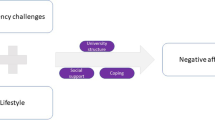Abstract
In describing the foundations of our pedagogical approaches to service-learning, we seek to go beyond the navel-gazing—at times, paralyzing—paradoxes of neoliberal forces, which can do “good” for students and their communities, yet which also call students into further calculative frameworks for understanding the “value” of pre-health humanities education and social engagement. We discuss methods to create quiet forms of subversion that call for a moral imagination in extending an ethics of care to students as well as to the communities with which they engage. While we recognize the partiality and limitations of our attempts, framing mentored service-learning in unexpected ways can help students and practitioners to understand their role within broader social, historical, cultural, and emotional contexts and encourage them to act intentionally toward the communities they seek to serve in response to this new self-knowledge. To that end, we outline an academically rigorous service-learning intervention at one of our universities.
Similar content being viewed by others
References
AAMC. 2016. Finding Health Care-related Volunteer Opportunities. Accessed July 12, 2016. https://students-residents.aamc.org/applying-medical-school/article/finding-health-care-related-volunteer-opportunitie/.
Butin, David. 2005. “Service Learning is Dangerous.” National Teaching & Learning Forum 14 (4): 0–4.
Carson, Ronald. A. 2003. “Educating the Moral Imagination.” In Practicing the Medical Humanities: Engaging Physicians and Patients, edited by R. A. Carson, C. R. Burns, and T. R. Cole, 25–37. Hagerstown, MD: University Publishing Group.
Cashman, Suzanne, and Sarena Seifer. 2008. “Service-Learning: An Integral Part of Undergraduate Public Health.” American Journal of Preventative Medicine 35 (3): 273.
Checker, Melissa. 2014. “Anthropological Superheroes and the Consequences of Activist Ethnography.” American Anthropologist 116 (2): 418.
Cole, Tom. R, Nathan. S. Carlin, and Ronald A. Carson. 2014. Medical Humanities: An Introduction. New York, NY: Cambridge University Press.
Deans, Thomas. 1999. “Service-Learning in Two Keys: Paulo Freire’s Critical Pedagogy in relation to John Dewey’s Pragmatism.” Michigan Journal of Community Service Learning 6 (1): 15–29.
Eby, John W. 1998. “Why Service-Learning is Bad.” Monograph. Accessed November 12, 2015. http://www.messiah.edu/external_programs/agape/servicelearning/articles/wrongsvc.pdf.
Freire, Paulo. (1970) 1995. Pedagogy of the Oppressed. New York, NY: Continuum.
Friedman, Lester. D. 2002. “The Precarious Position of the Medical Humanities in the Medical School Curriculum.” Academic Medicine 77 (4): 322.
Gahman, Levi. 2016. “Dismantling Neoliberal Education: A Lesson from the Zapatistas.” ROAR Magazine. Accessed April 11, 2016. https://roarmag.org/essays/neoliberal-education-zapatista-pedagogy/.
Giroux, Henry. 1988. Teachers as Intellectuals: Towards a Critical Pedagogy of Learning. South Hadley, MA: Bergin Garvey.
Gross, Jeffrey. P, Corina D. Mommaerts, David Earl, and Raymond G. De Vries. 2008. “Perspective: After a Century of Criticizing Premedical Education, Are We Missing the Point?” Academic Medicine 83 (5): 519.
Gruenewald, David A. 2003. “The Best of Both Worlds: A Critical Pedagogy of Place.” Educational Researcher 32 (4): 3–12.
hooks, bell. 1984. Teaching to Transgress: Education as a Practice of Freedom. New York: Routledge.
Kanter, Steven L. 2008. “Toward a Sound Philosophy of Premedical Education.” Academic Medicine 83 (5): 423–424.
Lupton, Deborah. 1993. “Risk as Moral Danger: The Social and Political Functions of Risk Discourse in Public Health.” International Journal of Health Services 23 (3): 425–435.
McGregor, Sue. 2001. “Neoliberalism and Health Care.” International Journal of Consumer Studies 25 (2): 82–89.
Metzl, Jonathan. 2012. “Structural Competency.” American Quarterly 64 (2): 213-218.
Mills, C. Wright. 1959. The Sociological Imagination. New York, NY: Oxford University Press.
Minkler, Meredith and Nina Wallerstein. 2003. Community Based Participatory Research in Health. San Francisco, CA: Jossey-Bass.
Mountz, Alison, Anne Bonds, Becky Mansfield; Jenna Loyd; Jennifer Hyndman; Magaret Walton-Roberts; Ranu Basu; Risa Whitson; Roberta Hawkins; Trina Hamilton; Winifred Curran. 2015. “For Slow Scholarship: A Feminist Politics of Resistance through Collective Action in the Neoliberal University.” ACME, International E- journal for Critical Geographies 7.
Pollack, Shoshana and Amy Rossiter. 2010. “Neoliberalism and the Entrepreneurial Subject: Implications for Feminism and Social Work.” Canadian Social Work Review 27 (2): 155–169.
Saltman, Kenneth and Alexander Means. 2015. “Students as Critical Citizens/Educated Subjects but not as Commodities/Tested Objects.” In The Sage Guide to Curriculum in Education, edited by M. F. He, B. D. Schultz, and W. H. Schubert, 284–292. Thousand Oaks, CA: Sage.
Vrasti, Wanda. 2011. “‘Caring’ Capitalism and the Duplicity of Critique.” Theory & Event 14 (4) Accessed November 17, 2015. https://muse.jhu.edu/.
Wear, Delese and Joseph Zarconi. 2010. “Challenging the Profession: Mentoring for Fearlessness.” In Mentoring in Academic Medicine, edited by H. Humphrey, 51–66. Philadelphia: American College of Physicians Press.
Wharton, Amy S. 2009. “The Sociology of Emotional Labor.” Annual Review of Sociology 35:147-165.
Zett Keith, Novella. 2005. "Community Service Learning in the Face of Globalization: Rethinking Theory and Practice." Michigan Journal of Community Service Learning 11 (2): 5–24.
Author information
Authors and Affiliations
Corresponding author
Ethics declarations
Ethical approval
This paper includes a quote from a short term pilot study that the University of Houston’s IRB committee approved.
Rights and permissions
About this article
Cite this article
Fletcher, E.H., Piemonte, N.M. Navigating the Paradoxes of Neoliberalism: Quiet Subversion in Mentored Service-Learning for the Pre-Health Humanities. J Med Humanit 38, 397–407 (2017). https://doi.org/10.1007/s10912-017-9465-1
Published:
Issue Date:
DOI: https://doi.org/10.1007/s10912-017-9465-1




